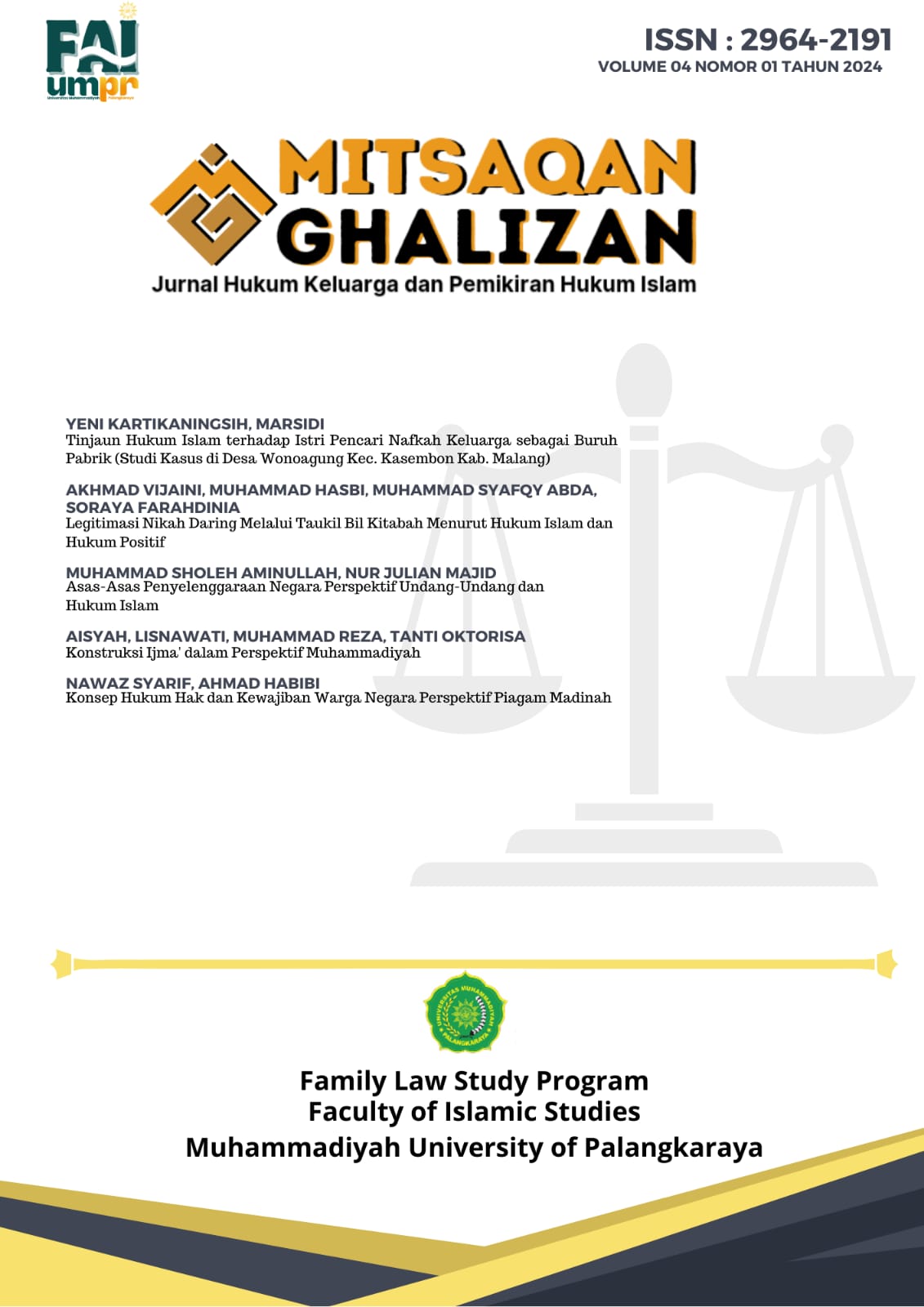TINJAUAN HUKUM ISLAM TERHADAP ISTRI PENCARI NAFKAH KELUARGA SEBAGAI BURUH PABRIK (Studi Kasus di Desa Wonoagung Kec. Kasembon Kabupaten Malang)
Main Article Content
Abstract
This research discusses the review of Islamic law regarding family support for wives who work in factories in Wonoagung Village, Kasembon subdistrict, Malang district. Currently, the trend of people's economic work activities seems to be getting stronger, not only men, but women also get good opportunities to work well in the economic and social fields. Regarding the household and the participation of a wife who works as a laborer in the family economy has a very helpful role in the survival of the family. A wife's participation in work is influenced by educational factors and her diploma. The method in this research uses qualitative research with a descriptive qualitative approach. The results of this research indicate that the role of wives living in Wonoagung Village has a dual role as wife to her husband and as mother to her children. A wife who helps earn a living to meet her family's needs. This is done to help ease the husband's burden in meeting his family's needs. Islamic law does not prohibit a wife from earning a living as long as it does not violate Islamic law and even allows her husband to help earn a living for the family as long as he does not neglect his responsibilities as a housewife, because the household requires the role of the husband as head of the family and the wife as a housewife.
Downloads
Article Details

This work is licensed under a Creative Commons Attribution-ShareAlike 4.0 International License.
References
Arikunto, S. (1998). prosedur penelitian suatu pendekatan praktek. jakarta: Pt Rineke cipta.
Azizah, L. (2012). Analisis Perceraian dalam Kompilasi Hukum Islam. Al-’Adalah, 10(2), 415–422.
Bahri, S. (2015). Konsep Nafkah dalam Hukum Islam. Kanun Jurnal Ilmu Hukum, 17(2), 381–399.
Jufri, J. (2021). Efektifitas Bimbingan Perkawinan Bagi Calon Pengantin Dalam Membangun Rumah Tangga Sakinah di KUA Kec. Maritengngae Kabupaten Sidrap. IAIN Parepare.
Kurnia, A. C. (2021). Tinjauan Hukum Islam Terhadap Pemenuhan Nafkah Suami Penyandang Disabilitas di Desa Mangkujayan dan Desa Nologaten Kabupaten Ponorogo. IAIN Ponorogo.
Moleong, L. J. (2005). Metodologi Penelitian Kualitatif. Bandung: PT Remaja Rosda karya Offset Nawawi, Ismail, 2009. Public Policy: Surabaya: PNM.
Muin, R. (2021). Tinjauan Hukum Islam Terhadap Istri Sebagai Pencari Nafkah. J-Alif: Jurnal Penelitian Hukum Ekonomi Syariah Dan Budaya Islam, 2(1), 85–95.
Nasution, S. (2009). Metode Research (penelitian ilmiah).
Said, D. H. (2020). Peran Istri dalam Membangun Ekonomi Keluarga Menurut Perspektif Hukum Islam di Kecamatan Panyabungan Kota. AT-TAWASSUTH: Jurnal Ekonomi Islam, 5(2), 268–290.
Sugiyono, P. D. (2009). Metode Penelitian Kuantitatif Kualitatif Dan R&D, Bandung: Cv. Alvabeta.
Syaidun, S. (2019). Tinjauan Hukum Islam Terhadap Nafkah Keluarga Dari Istri Yang Bekerja. Al-Mabsut: Jurnal Studi Islam Dan Sosial, 13(1), 89–104.
Syarifuddin, Amir 2011. Hukum Perkawinan Islam di Indonesia Antara Fiqh Munakahat dan Undang-undang perkawinan, Jakarta: Kencana, 2011.
